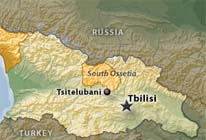Diplomats: Russian pull-out from Georgia not enough to resume talks
 Brussels - The European Union should not re-start talks on a partnership agreement with Russia until it pulls some 4,000 extra troops out of the breakaway Georgian regions of South Ossetia and Abkhazia, sources from a number of member states said Thursday.
Brussels - The European Union should not re-start talks on a partnership agreement with Russia until it pulls some 4,000 extra troops out of the breakaway Georgian regions of South Ossetia and Abkhazia, sources from a number of member states said Thursday.
"Talks on the Partnership and Cooperation Agreement (PCA) should not be opened before the Russian troops have decreased their numbers, including in South Ossetia and Abkhazia," an EU diplomat who asked to remain anonymous told Deutsche Presse-Agentur dpa.
That stance appears to contradict a statement made by the head of the European Commission, Jose Manuel Barroso, who said on Wednesday that EU member states could resume talks on the PCA even if Russia maintains a military presence in the separatist zones.
"The (EU) decision ... was not to go on with the talks on a new agreement with Russia before Russian troops withdraw from their positions inside Georgia, with the exception of South Ossetia and Abkhazia, because they were already there," Barroso said after meeting Lithuanian Prime Minister Gediminas Kirkilas in Brussels.
The disagreement concerns the exact meaning of the decision reached by EU heads of state and government at an emergency September 1 summit on the Russian-Georgian war, which broke out on August 7.
On that occasion, EU leaders agreed that "until (Russian) troops have withdrawn to the positions held prior to 7 August, meetings on the negotiation of the (PCA) will be postponed."
On September 8, French President Nicolas Sarkozy, the current holder of the EU's rotating presidency, flew to Moscow and brokered a deal under which Russian troops would pull out of all of Georgia except for the separatist regions, and be replaced with EU ceasefire monitors. Barroso also attended those talks.
If Russia lived up to the pull-out pledge, the EU could re-open the PCA talks, Sarkozy said at the time.
But one day later Russia announced that it was going to more than double the number of troops it maintains in the two separatist regions, whose independence it recognized on August 26, to 7,600.
Prior to the conflict, Russia had maintained some 3,500 peacekeepers under international mandate in the regions.
Moscow's move sparked outrage within the EU, with some member states saying that the bloc should refuse to re-open PCA talks until the extra troops were returned to their barracks.
"The EU highlights the importance that Russian forces should pull back from the buffer zones and also Abkhazia and South Ossetia," Swedish Foreign Minister Carl Bildt said at a meeting with EU foreign ministers on Monday.
"Nowhere has the EU said that it would accept it if Russia doubles its forces in South Ossetia and Abkhazia," he said.
The EU is now expected to return to the question at a meeting of foreign ministers on October 13 and a summit two days later.
"That's the crucial question, and it's a hugely sensitive one," one national diplomat acknowledged.
The PCA is intended as a binding contract between the EU and Russia covering relations on issues as diverse as trade, energy, education and tourism. (dpa)